School of Rock
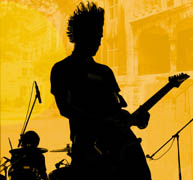
Shutterstock
Montreal's music scene is exploding and McGill alumni are playing pivotal roles, earning rave reviews and gunning for Grammys
Also see:
Aspiring musicians with thoughts of being the next Yo-Yo Ma, Luciano Pavarotti or Charles Mingus arrive at the Schulich School of Music expecting to receive the kind of world-class training that will help them pursue those ambitions. But what about a young guitar-slinger with dreams of becoming another John Lennon? Not so much.
While McGill offers internationally respected programs in classical music, opera and jazz, anyone wanting to learn to emulate Elvis Costello's sly songwriting style or Mick Jagger's signature swagger is largely out of luck.
Which makes it all the more remarkable that so many of Canada's most talented and successful pop musicians are McGill graduates. Young alumni populate many of Montreal's best bands, including the Arcade Fire, Wolf Parade, the High Dials, the Dears, the Bell Orchestre, Islands, the Lovely Feathers and Throwback. Other graduates include Juno-winning rock heartthrob Sam Roberts, BA'98, innovative turntablist Kid Koala (a.k.a. Eric San, BEd'96) and bilingual pop noir crooner Thomas Hellman, BA'98, MA'04.
Throw in Kate McGarrigle, BSc'70, who, along with sister Anna, is one of the most respected songwriters of her generation, bassist Mauro Pezzente, MSc'97, PhD'97, a co-founder of the edgy instrumental group Godspeed! You Black Emperor, and a couple of guys that many pop musicians admire with an almost religious reverence - Burt Bacharach, AMus'48, DMus'72, and Leonard Cohen, BA'55, DLitt'92 - and you've got the makings of a concert for the ages.
Concerts with Kanye
Science student Alain Macklovitch would be part of the bill too. Macklovitch managed to cram in a couple of courses last year, but has been spending most of his time away from campus lately, serving as Kanye West's onstage DJ during the Grammy-winning hip-hop superstar's recent tour.
It's been quite the adventure. Macklovitch has accompanied West during performances on Saturday Night Live and at the MTV Awards, and has had the chance to hobnob with everybody from Jay-Z to Hillary Duff at post-concert parties.
So why would West, an astute judge of talent (triple Grammy winner John Legend is among his protegés), reach out for an Outremont boy studying biology and physics?
Because Macklovitch is one of the best in the world at what he does. He's been proving it since he was 15.
Macklovitch, better known as DJ A-Trak, employs turntables, sound mixers and a vast collection of vinyl LPs to create new forms of music out of old - taking bits and pieces from a variety of records and combining them in novel ways. Macklovitch caught the DJ bug as a young teen, after stumbling upon older brother David messing around with their dad's belt-drive turntable, trying to create some interesting sounds by scratching (manipulating the records by hand). Alain had a go at it. According to David Macklovitch, BA'00, MA'03, now a music editor at Vice magazine and half of the funky electronica duo Chromeo, it was immediately apparent that his younger sibling was a natural.
"What he was doing was already sounding close to the scratches on the Tribe Called Quest and Beastie Boys' records we were bumping all day. I pushed him to keep trying."
Alain's abilities quickly blossomed. "I felt I was doing something unique, something not many people could do." His bar mitzvah bounty went towards purchasing a new turntable and a mixer.
He pursued his craft diligently, practicing for hours on end. "His chief strength has always been his discipline and work ethic," recalls David. "That dude is like a monk."
After about a year, A-Trak was ready for club gigs. Dodging security staffers, the under-aged Macklovitch hid in DJ booths until it was time for him to perform.
He started entering DJ competitions, in which turntablists square off against one another, each try-ing to impress judges with their own unique mixes and showmanship. Macklovitch captured the DMC world championship in 1997 at the age of 15, becoming the youngest champ ever. There was plenty of grumbling among some of his rivals that this baby-faced DJ was a fluke, a novelty act.
"My attitude was, yeah, whatever. Next year I'll kill them again." Sure enough, A-Trak won his second world title. "That shut down the haters," he laughs. By the time he was 18, he'd earned five of turntablism's most coveted international honours.
A chance encounter two years ago gave Macklovitch a huge career boost. A-Trak was demonstrating his talents during a London, England, record store appearance when Kanye West dropped by. West was impressed and invited Macklovitch to join his upcoming concert tour. A-Trak soon found himself performing in front of sold-out stadiums and crowds of 20,000.
"One thing that's guaranteed with Kanye is that he really gives everybody he works with an opportunity to shine," says Macklovitch. "I would be on stage and see my name in huge letters and Kanye would shout out, 'A-Trak! Show these people why you were the world champion five times!'"
As West's confidence in Macklovitch's abilities grew, the DJ was given more opportunities to contribute to West's shows. "I felt like we finally managed to build the kind of sets that I wanted to do with him, where I was able to integrate my scratching into the songs like any other instrument," says Macklovitch. He also lent his talents to two tracks on hip-hop performer Common's West-produced album Be and to West's own smash hit, "Golddigger."
Working with West has been the opportunity of a lifetime, but Macklovitch, who just released a DVD, Sunglasses is a Must, is anxious to fly solo. "I definitely don't mind performing someone else's song - as a DJ that's what you do most of the time. But I just can't wait to have more tracks to play people, and to hear their reactions too."
Then there is the matter of completing his degree, something he is determined to do.
"My whole family is school-oriented," he explains. His father heads an Université de Montréal research team in linguistics. His mother is a translator with grad-school training. Brother David is working on a PhD at Columbia University.
Juggling music and studies "is just what I'm used to. School has always imposed a structure on my schedule. I once took a year off from McGill to focus on my music and that was probably my least productive period."
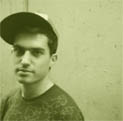 |
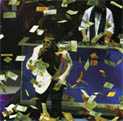 |
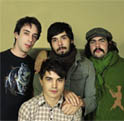 |
From left to right: Alain Macklovitch, a.k.a. DJ A-Trak, and on stage with Kanye West at the 2005 MTV Awards, Hadji Bakara (back row centre) with his band Wolf Parade
Pausing the Parade
Somebody else wrestling with balancing McGill studies and a burgeoning musical career is Hadji Bakara, BA'04. Bakara is part of one of the hottest bands around, Wolf Parade, whose debut album, Apologies to the Queen Mary, was feted by music critics throughout North America. Spin magazine, the Los Angeles Times, the Globe and Mail, Pitchfork and the Associated Press all named it one of the best offerings of 2005.
Moments into a conversation with Bakara, one thing is clear - this is not a rock star from central casting. He talks of "explications" and "paradigms" and says he is looking forward to walking away from the music scene to focus on a McGill master's degree dealing with German philosopher Peter Sloterdijk's views on cynicism.
"This isn't the apogee of my ambitions," Bakara says of Wolf Parade's success. "I'm anxious to get my academic career back on track. That's where my real ambitions lie."
Bakara plays a unique role in Wolf Parade. While his bandmates play more conventional instruments, Bakara operates a laptop and synthesizer on stage, adding an assortment of odd and compelling sounds and textures to the group's songs, never detracting from their propulsive urgency. "Hadji is Wolf Parade's secret weapon," declares Exclaim! magazine. Bakara downplays concerns that the band might be a victim of its own success. Many much-hyped groups, like the Strokes, suffer from a backlash once they release their second albums.
"There's always a fear that the perfunctory interest in a band won't be sustained beyond the initial media storm. We're confident in our music. We think people will want to keep listening."
Bakara has his own take on why Montreal is producing so many successful bands right now. He gives much of the credit to fellow McGill graduate Mauro Pezzente and his group, Godspeed! You Black Emperor.
"It never would have happened without Godspeed's money," Bakara posits. Godspeed members invested in the city by building recording studios and establishing concert venues (Pezzente co-owns a couple of prominent concert halls) that have benefited many bands. "Pop music in this city wouldn't have emerged the way it did without that."
Pop goes the festival
Daniel Seligman, BA'00, has also played an important role in nurturing Montreal's music scene. Seligman is the co-founder and creative director of Pop Montreal, an annual autumn festival that showcases a wide variety of musical artists, both local and international.
Headliners last fall included Beck and Mercury Award winners Antony & the Johnsons, but most of Pop Montreal's acts are promising groups struggling to find an audience. The festival provides an invaluable showcase. And in a city that is very discriminating when it comes to festivals - Montreal's jazz and comedy festivals are world-renowned - Pop Montreal has carved out a solid niche for itself since its inception in 2002.
According to the Montreal Gazette, Pop Montreal has managed to achieve "major-festival status without losing its street cred." The National Post says it's "the hottest new-music festival in the country."
"There is no recipe for success," Seligman replies when asked if he has any tips for aspiring festival organizers. "But if you are going to take on something that's this crazy, you better be passionate about what you're doing."
Pop Montreal has a reputation for being laid-back, a festival that is decidedly less corporate than its counterparts in other cities, where bands gear their concerts to record company talent scouts, not to fans. Seligman and his Pop Montreal team (which features plenty of McGill graduates, including executive producer Noelle Sorbara, BA'00, and managing director Mary-Catherine Anderson, BA'95) try to keep things as intimate and relaxed as possible.
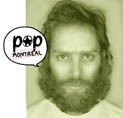 |
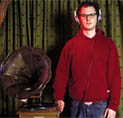 |
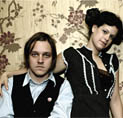 |
From left to right: Pop Montreal creative director Daniel Seligman, Josh Dolgin, a.k.a. Socalled, Arcade Fire's Win Butler and Régine Chassagne
Jiggy with his Jewishness
Seligman also manages the career of Josh Dolgin, BA'00, a unique voice on the hip-hop scene who performs and records under the name Socalled. Dolgin headlined one of Pop Montreal's most memorable shows last year, his unruly mop of hair flailing as he juggled the accordion, the piano and computerized sound effects, sharing the stage with alt-country crooner Katie Moore, BA'98, a rapper, a violinist, a beat-boxer, 90-year-old pianist Irving Fields and an assortment of other musicians who combined to create a joyfully chaotic whirl.
Dolgin's first CD, The Socalled Seder, marries old musical traditions with new. It's a hip-hop record that's chock-full of cantorial music, old Yiddish theatrical tunes and klezmer rhythms - sounds one typically doesn't expect to hear on a hip-hop offering.
A few years ago, Dolgin wouldn't have expected to hear them either. A longtime hip-hop enthusiast, Dolgin has amassed a record collection of over 4,000 albums, combing used record stores for interesting sounds he could sample when making music of his own. In the process he stumbled upon Jewish recordings from decades past and became enthralled.
"Listening to these old records, there was a whole different kind of flow, a whole way of making music that was really catchy." He hunted for more of these records, attending conferences devoted to old Jewish musical traditions to track them down. Dolgin says much was wiped out thanks to the Holocaust and other forces.
"Stalinism in Russia stomped out the last vestiges of Yiddish in Europe. And when Jews came to America after the war, a lot of them wanted to shed their cultural identity and just pretend to be like everyone else."
Dolgin enlisted an impressive and eclectic group of musicians to help craft The Socalled Seder, including Wu Tang Clan hip-hop star Killah Priest and clarinetist and Kronos Quartet collaborator David Krakauer.
While hip-hop is generally considered to be the music of black urban America, "hip-hop is evolving and it can express any number of things," says Dolgin. As a white Jewish boy from small-town Quebec, he isn't rapping about gangstas, guns or ghettos. "But doing this, making this music fresh and relevant, that does make sense coming from someone like me."
He is winning over some impressive fans. Irving Fields, a veteran composer who penned hit songs for the likes of Dinah Shore and Guy Lombardo, is one. Another is Emmy winner Theodore Bikel, best known from his long Broadway run as Tevye in Fiddler on the Roof. Bikel saw Dolgin in action at a Yiddish festival in Poland and was so impressed he volunteered his services for Socalled's next album.
Thanks to the breakout success of bands like Arcade Fire and Wolf Parade, publications like Spin and the New York Times have been quick to label Montreal "the next big thing" in music. Pop Montreal's Seligman thinks the attention is well merited.
"I don't think we'll be a flash in the pan," he says. "There are bands here doing substantial things. And this is a city that always attracts interesting people, people who come here and add to the flavour of the place."



